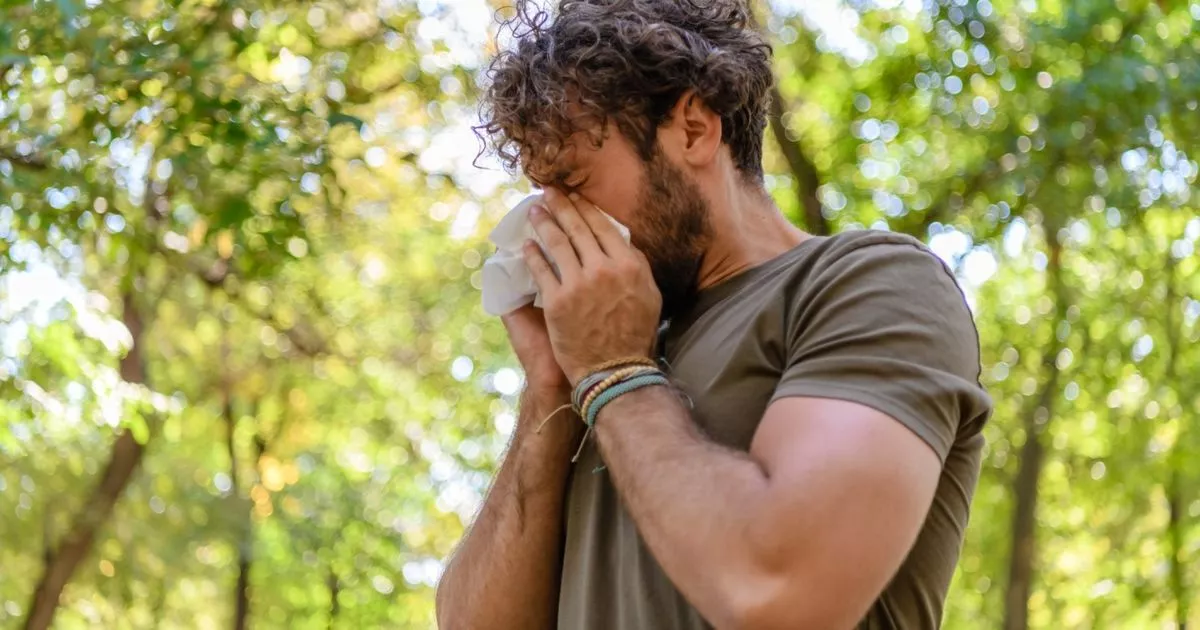A hay fever expert has revealed how to cope with high pollen levels as the Met Office issues an amber ‘high’ alert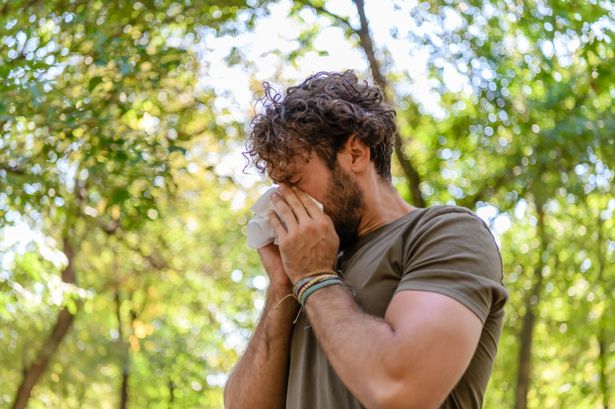 Hay fever is a common condition that affects 10 million people each year(Image: Getty Images)
Hay fever is a common condition that affects 10 million people each year(Image: Getty Images)
The North West has been issued with an amber ‘high’ alert from the Met Office over the coming days.
Pollen warnings have been triggered across the UK this week with medium and amber high alerts issued after a surge in oak pollen, along with some early flowering grass pollen.
During the spring and summer months, the Met Office issues a pollen forecast to warn hay fever sufferers of when to expect their symptoms to worsen.
Hay fever – an allergy to pollen – affects more than 10 million Brits. Warmer weather brings conditions in which pollen thrives, and the Met Office has warned that pollen levels could soar as temperatures could climb to 22C in Manchester on Sunday (May 11).
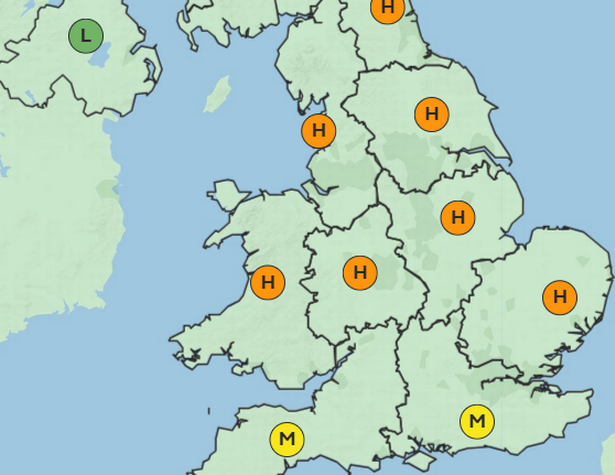 The Met Office forecasts ‘high’ pollen levels across much of the UK on Friday (May 9)(Image: The Met Office )
The Met Office forecasts ‘high’ pollen levels across much of the UK on Friday (May 9)(Image: The Met Office )
Hay fever, also known as allergic rhinitis, is caused when the body makes allergic antibodies to harmless allergens such as pollen, dust mites or animal fur. When your immune system reacts with these allergens, it releases chemicals called histamines which trigger symptoms.
Symptoms include sneezing and coughing, a runny or blocked nose, itchy or watery eyes, and an itchy throat, mouth, nose and ears, the NHS says.
According to new research from local service marketplace Airtasker, nearly a third of Mancunians (29%) say their hay fever interferes with everyday tasks, and 37 per cent admit to staying indoors to limit their symptoms.
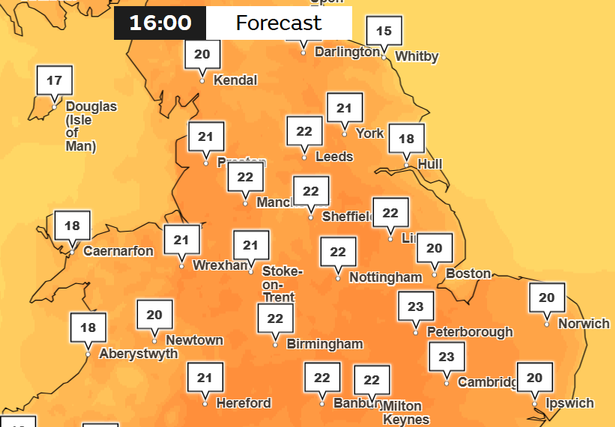 The Met Office forecasts highs of 22C and 23C across England on Sunday (May 11)(Image: The Met Office )
The Met Office forecasts highs of 22C and 23C across England on Sunday (May 11)(Image: The Met Office )
Hay fever sufferers across Manchester are losing an average of four and a half hours a week sneezing and sniffling, the research revealed, with five per cent even avoiding taking the bins out and six per cent even forced to skip walking the dog because of hay fever.
Do’s and don’ts for hay fever sufferers this weekend
Pollen levels in the North West are set to remain ‘high’ throughout the weekend and into Monday (May 12), Met Office forecasts show. According to airborne allergens expert Max Wiseberg, most hay fever sufferers start to experience symptoms when the count reaches ‘moderate’.
As temperatures dropped over the recent bank holiday weekend, as did pollen levels – and Wiseberg says many people may have stopped taking their medications as a result.
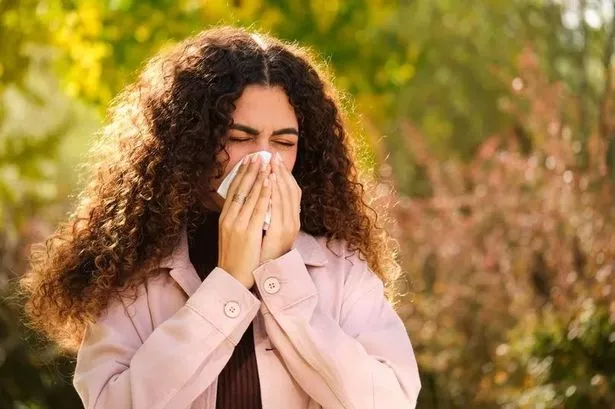 Symptoms of hay fever include sneezing, a runny nose, and itchy or watery eyes(Image: Getty Images)
Symptoms of hay fever include sneezing, a runny nose, and itchy or watery eyes(Image: Getty Images)
As well as taking medication as pollen counts rise, Wiseberg advised: “When you go outdoors, as well as using an allergen barrier balm, wear wraparound sunglasses to help stop pollen getting in your eyes. Tie up long hair and wear a cap or other head cover to help stop pollen getting in your hair.”
To those planning barbecues in the warm weekend weather Wiseberg has revealed the best foods to include in your spread to help to limit hay fever symptoms.
He said: “Many fruits and vegetables contain quercetin, which is thought to limit the release of histamine, the chemical that sets off allergy symptoms in your body.
“So try to incorporate these into salads and other dishes. Red onions, kale, cherry tomatoes, broccoli, blueberries and apples are good options. And garlic reduces catarrh.”
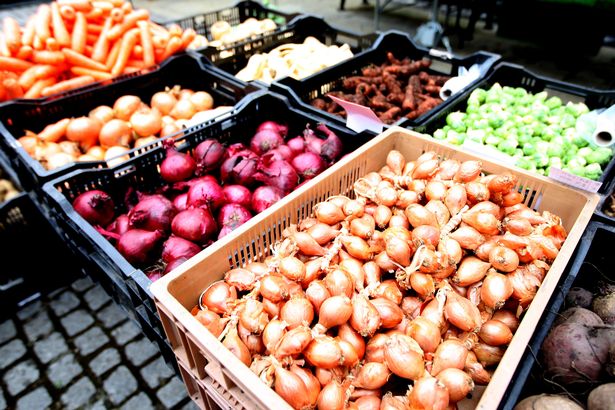 Fruit and vegetables can help to reduce hay fever symptoms, according to one expert(Image: PA)
Fruit and vegetables can help to reduce hay fever symptoms, according to one expert(Image: PA)
Wiseberg also recommends removing footwear, washing your face or taking a shower, and putting on clean clothes after returning home from being outdoors. He says this will remove pollen that has attached itself to your hair, body and clothes.
He added: “Keep doors and windows closed, especially during the day to help stop pollen getting in your home. This also applies when driving – keep car windows closed and use the air conditioning instead. Though ensure that air conditioning or a pollen filter is cleaned regularly, so pollen is filtered out effectively.”
